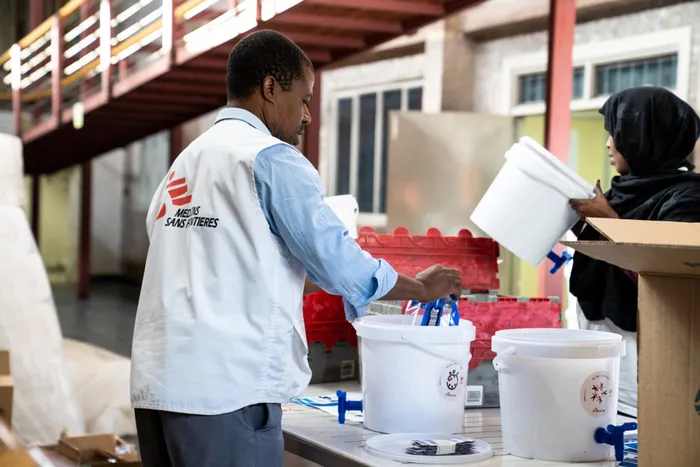Little accountability in the time of cholera

Picture: Bafana Ngwenya/MSF – MSF cholera hygiene kits distributed in the community of Kanana in Hammanskraal, South Africa, comprise 10 oral rehydration solution tablets, five soap bars, 120 Aquatabs (enough to kill micro-organisms in up to 40 litres of water a day for a month), one 10 litre bucket and one jerrycan for potable water storage.
History suggests that cholera may have plagued humanity from as early as the 5th or 4th Century BCE. Through the ages, cholera has flourished in impoverished communities where daily squalor, overcrowding, inadequate access to clean water and poor sanitation has been a ready breeding ground for this deadly illness. Today cholera has yet to be fully flushed out of modern-day societies. It is almost beyond belief, given the technological investments and advances in water preservation and management, that so many lives are being lost to a disease that should long have died a natural death.
As deadly as cholera is, it is easily preventable through the provision of clean water, and it does not require a miracle cure. In their paper Cholera Outbreaks to pandemics: the role of poverty and inequality, Nejat Anbarci, Monica Escaleras and Charles Register cite cholera as a leading cause of death among the global poor. “Cholera and humans have co-existed for centuries, to the detriment of the latter, as the disease is both extremely easy to contract and transmit,” the authors say.
Although cholera knows no borders, it has caused particular damage in poor countries and communities. When a cholera pandemic hit Brazil in 1993, it was the country’s deeply impoverished Northeastern area that was hardest hit. Anbarci and Escaleras say the probability of death after contraction of cholera is three times the national average in Brazil’s poorest areas.
Today, cholera continues to be a death sentence for many, especially those caught in the faucet of penury, conflict, and climate challenges. Poverty, war, and climatic crises, three man-made phenomena, have given new life to cholera. And as always it is the poor and most vulnerable who suffer most.
In February 2023, the World Health Organisation (WHO) warned of a growing wave of cholera globally and in Africa, in particular. An alarming 26,000 cases and 660 deaths were reported in ten African countries in January of this year. During the period from 2014 to 2021, 21 percent of cholera cases and 80 percent of deaths were in Africa. The WHO has sounded the alarm that 2023 could be the worst year for cholera in Africa in nearly a decade.
Malawi is battling its worst cholera outbreak in two decades. Mozambique and Zambia are also affected. Ethiopia, Kenya, and Somalia are all experiencing heightened cholera outbreaks as a direct consequence of prolonged and severe droughts in those countries. Burundi, Cameroon, the Democratic Republic of the Congo, and Nigeria have also reported cases.
Dr Matshidiso Moeti, the Regional Director for Africa for WHO said, “We are witnessing a worrying scenario where conflict and extreme climatic events are worsening the triggers of cholera and increasing its toll on lives.”
Over the past few weeks, South Africa’s Hammanskraal has been a place of tears as cholera has claimed twenty-six lives to date, and this tally is set to rise. The cause of the outbreak has yet to be found but in typical fashion, the ANC is washing its dirty hands of accountability. It was not us, the ANC’s Secretary General, Fikile Mbalula, said emphatically during his visit to the area. He pointed fingers at the DA saying that the frequent changing of mayors by the DA has affected governance in the area.
The DA has also climbed onto the blame game bandwagon as the mayor of Tshwane Cilliers Brink says, “we have failed to eradicate a network of corruption”.
In a recent interview with Eyewitness News (EWN) on the cholera outbreak in Hammanskraal, former President Thabo Mbeki described it as “an illustration of the continued deterioration of governance”.
It is not us, President Cyril Ramaphosa piped last week - our water is fine and “compares well with the best in the world”. But this week the Department of Water and Sanitation released the interim Blue, Green and No Drop Watch Report which shows that the country’s water quality is declining due to lack of infrastructure maintenance and municipalities’ lack of compliance.
Zama Mbeki of the Gauteng Human Rights Commission said in a Carte Blanche interview that government was warned about Hammanskraal’s failing water infrastructure years ago.
Dr Ferrial Adam, executive manager of WaterCAN, a project of OUTA focused on water-related issues recently wrote how “the great overarching tragedy of the deadly cholera outbreak tearing through the community of Hammanskraal is that it was entirely predictable, that the toxic water conditions were well documented, and various arms of the state had on numerous occasions committed to intervene but failed to do so”.
Hammanskraal was established under apartheid as a place designated to house black workers. Such areas were effectively reservoirs of black labour, for white capital. One could not expect that the apartheid government would care for such areas or the communities that “lived there”. “For they were simply there to service white interests.” Writer, Bongani Madondo, who was born in Hammanskraal describes it as one of many ‘man-made sorrows’. One would expect though that under a democratically elected black government, Hammanskraal would be less of a forsaken place.
One would have hoped that it was a place where the promise of a better life for all would be tangible and visible. Where taps of opportunities would bring flourish, not death. But today in the time of cholera, the lack of accountable, empathetic, and responsible government is a real plague. The Sorrow continues.
Heller is a political analyst and author of ‘No White Lies: Black Politics and White Power in South Africa’.
This article was written exclusively for The African. To republish, see terms and conditions.